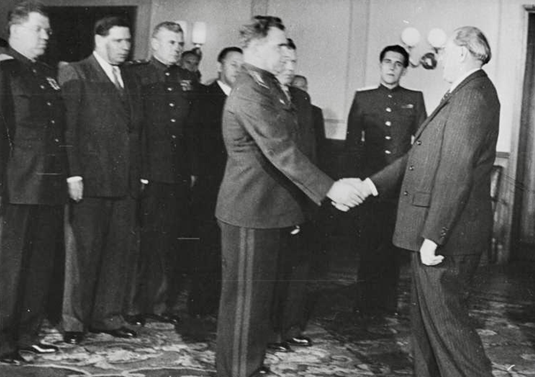Marshal Chuikov: A Culturally Intelligent Leader
- Maria A. Kithcart

- Nov 6, 2021
- 3 min read

Photo from 1957 visit of Chinese delegation to the Kiev Military District, when Marshal Chuikov was the Commander there. He is to the right of Peng Dehuai, the former Defense Minister of the People’s Republic of China.
Another aspect of successful leadership is the possession of cultural intelligence (CQ), which is described as having three dimensions—emotional/motivational, cognitive, and physical. Due to developing a high level of self-awareness and empathy, authentic leaders who are also culturally intelligent understand how to navigate through unique multicultural situations. Leaders with CQ can adapt their behavior in ways that are sensitive to and reflective of a different culture.
After conducting research on authentic leadership and CQ theories for the past 4 years, it is rewarding to find a historical figure who is not as well known in the western world who embodies these characteristics. It is my assessment that Marshal Vasily Ivanovich Chuikov was an authentic leader who possessed a significant level of cultural intelligence as demonstrated in his book Mission to China.
Chuikov’s successes during the Russian Civil War, his studies at Frunze Military Academy in the early 1920s, his foreign language fluency, and previous intelligence service in China in the late 1920s prepared him well for a special task assigned to him personally by Josef Stalin. Mission to China describes his work as the Chief Military Adviser for Chiang Kai-shek from the end of 1940 until early 1942 to aid the Chinese defense against Japan. This effort also kept Japan from attacking the Soviet Union in the Far East, which meant defense efforts could be focused on the west against the invading German Army during Operation Barbarossa. Marshal Chuikov was and is still recognized and revered in China for his contributions during the Great Patriotic War and was awarded the Order of the Cloud and Banner with Special Grand Cordon in 1941. His approach and method are outlined in this excerpt:
“Our outgoing Chief Military Adviser was Divisional Commander K. M. Kachanov. From talks with him and other staff members, I concluded that my comrades had not always built the right kind of working relationship with the War Ministry and the Chinese commanders in the field. Our advisers were anxious to help the Chinese people inflict total defeat on the enemy, and to this end they were risking their lives. But the weak spot for many was their inadequate understanding of China and its ways. From my earlier time in the country, I knew how important such knowledge was. Thus, my assistants and I had to make our people understand how best to work with the Chinese. Our senior advisers were brought from the outlying districts to Chungking and given explicit instructions. Those who learned the proper approach were not only less likely to make mistakes in working with the Chinese but also were more likely to better serve as advisers.
Our people had to be exceptionally careful in their work. They had to keep in mind the high premium placed by Chinese commanders on established practice, and their impatience regarding the most reasonable criticism. Special techniques were necessary. Let us suppose that a Chinese general decided to launch an offensive (or go on the defensive) and that his battle plan was, to say the least, seriously flawed. If the adviser offered candid criticism, he would either gain himself an enemy or else be ignored from then on. Thus, whether the plan had any merits, the adviser first had to admit to its excellence, if not genius, and make this known to everyone. But under the pretext that the commander's subordinates might be able to better execute the plan, the adviser would request permission to introduce a few clarifications. It may be taken for granted that, after the adviser's earlier high praise, the commander would permit a "few" adjustments to be made. The adviser's proposals could then be carried out as if they came from the commander himself.
Should the plan meet with success, the adviser would remain in the background while the commander publicly received the laurels of victory. In the event of failure, the adviser had to find reasons justifying the commander and his men, or he might even compliment them on a victory. When I was first introduced to Chiang Kai-shek at the New Year’s Eve reception, I began the conversation by congratulating him on the successes of the Chinese army, even though these in fact did not exist. But Chiang appreciated my gesture.”



